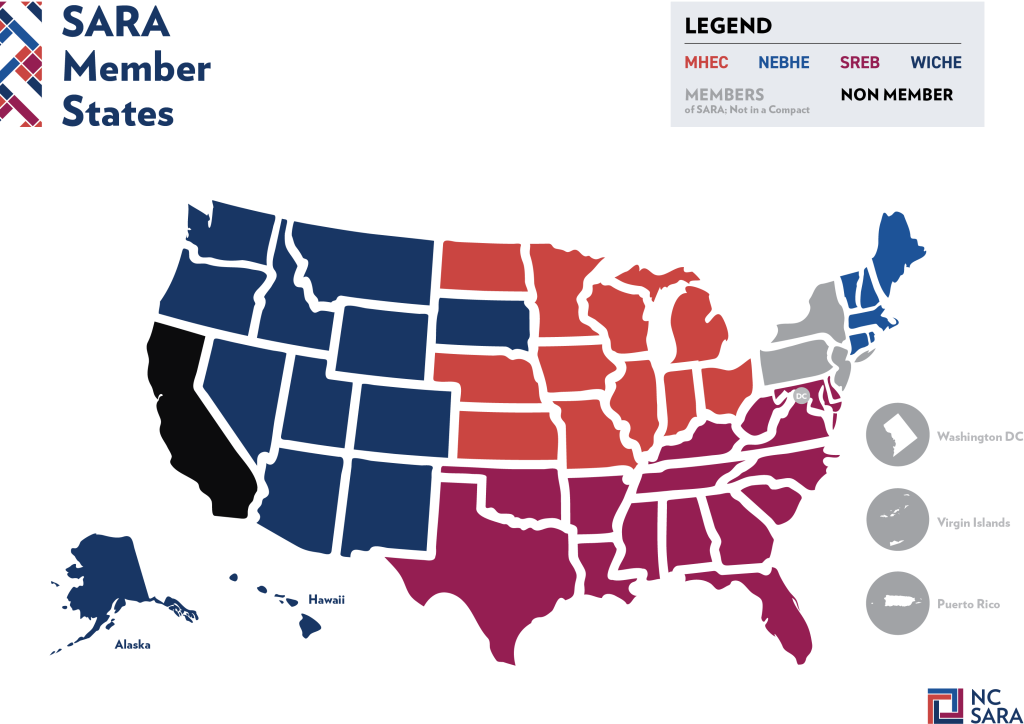National Council for State Authorization Reciprocity Agreements (NC-SARA)

State Authorization for Distance Education
The University of Maine is a member of NC-SARA, the National Council for State Authorization Reciprocity Agreements. NC-SARA oversees reciprocity agreements that facilitate the UMaine student’s participation in distance education, and on-site experiences outside the State of Maine, such as internships, externships, practicums, field experiences, and clinical experiences.
Professional Licensure Disclosure Statement
The University of Maine cannot confirm that its courses or degree programs meet the requirements for professional licensure outside of the State of Maine. The University of Maine strongly encourages prospective and current students to contact the appropriate or applicable licensing board(s) in states in which they may wish to pursue licensure prior to beginning any program of study.
Consistent with new federal requirements, UMaine is collaborating with professionals from each of the UMS campuses to develop more adequate ways to disclose to students whether our professional licensure-related courses and degree programs meet the requirements for professional licensure in the states where students reside. This disclosure mechanism will be available in late Fall 2020. Until then, inquiries regarding the applicability of licensure programs to the states in which our distance students reside may be directed to richard.roberts@maine.edu.
Authorization for Out-of-State Experiences in California
State laws require permission for out-of-state students to participate in on-site educational experiences. With the exception of California, all states are covered under the State Authorization Reciprocity Agreement. Students seeking to complete an internship, externship, practicum, field experience, research experience, or clinical experience in California must first obtain state authorization. Such authorization is managed through the University of Maine System.
UMaine must petition California’s state Department of Education to request a waiver for each student participating in an out-of-state internship, externship, practicum, field experience, research experience, or clinical experience in California. Please email richard.roberts@maine.edu to obtain the required form for forwarding to the UMS state authorization staff person.
SARA State Student Complaint Process
Students with complaints about a distance education experience must first follow the Administrative Student Appeals Policy for filing complaints, found in the University of Maine’s Student Handbook (page 57).
SARA consumer protection provisions require colleges and universities to investigate and resolve allegations of dishonest or fraudulent activity by a provider, including the provision of false or misleading information. Examples of types of student complaints that may be brought to a SARA portal entity include, but are not limited to, complaints regarding the accuracy of job placement data, tuition or fee information, accreditation, whether a program meets professional licensing requirements, or course transfer information. Grade appeals and student conduct appeals are not allowed under SARA.
After following UMaine’s Administrative Student Appeals Policy, students participating in a distance education experience may seek further action through the following Maine Department of Education process:
State of Maine Complaint Form. This form should be used by any current student or former student enrolled in a distance education degree program or participating in an on-site experience outside the State of Maine (internships, externships, practicums, field experiences, and clinical experiences), who seek to file a complaint against a degree-granting institution approved to operate under the State Authorization Reciprocity Agreement (SARA).
- Students should exhaust the formal complaint process of the host institution.
- Students should file a complaint through SARA that includes documentation that the student has exhausted the formal complaint process at the host post-secondary institution.
- The Maine DOE reviews the complaint and supporting documents. The Maine DOE may request further documentation from the participating SARA institution mentioned in the complaint.
- Maine DOE determines if the resolution of the host institution is acceptable. If so, the complaint process is concluded and the previous resolution is sustained. If the previous resolution is found not acceptable by the Maine DOE, then the complaint will be further investigated until resolved.
- Students receive a final disposition letter from the Maine DOE.
Contact Us

Richard Roberts, M.S.
Executive Director of Academic Program Support and Online Learning
NC-SARA Representative
207.370.1515 richard.roberts@maine.edu

